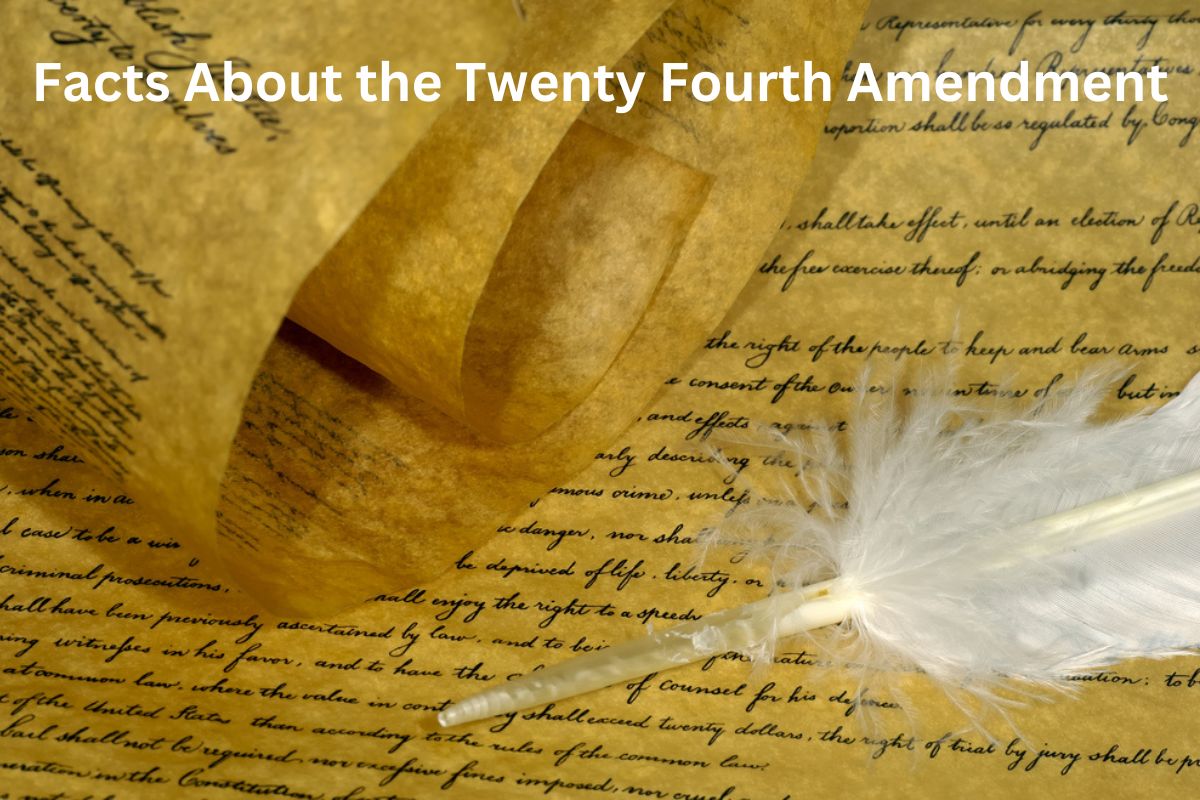The Twenty Fourth Amendment to the United States Constitution was ratified in 1964 and prohibits the use of poll taxes as a requirement for voting in federal elections.
This amendment was passed during the Civil Rights Movement, a time when many Americans were fighting for equal rights and an end to segregation.
The amendment helped protect the voting rights of all Americans by ensuring that they could not be denied or abridged by the United States or any State by reason of failure to pay any poll tax or other tax.
The text of the 24th Amendment reads:
“The right of citizens of the United States to vote in any primary or other election for President or Vice President, for electors for President or Vice President, or for Senator or Representative in Congress, shall not be denied or abridged by the United States or any State by reason of failure to pay any poll tax or other tax.”
The 24th Amendment remains an important part of the Constitution that helps ensure that all Americans have the right to vote, regardless of their ability to pay a fee.
24th Amendment Facts
1. The 24th Amendment to the United States Constitution was ratified on January 23, 1964.
The 24th Amendment to the United States Constitution was ratified on January 23, 1964, making it part of the supreme law of the land.
Also Read: Facts About the Twenty Third Amendment
The 24th Amendment was an important part of the Civil Rights Movement, helping to ensure that all Americans had the right to vote, regardless of their ability to pay a fee.
2. The amendment prohibits the use of poll taxes as a requirement for voting in federal elections.
The 24th Amendment prohibits the use of poll taxes as a requirement for voting in federal elections. A poll tax was a fee that people were required to pay in order to vote. It was used as a discriminatory tactic to prevent African Americans and poor whites from voting in the South.
Also Read: 25th Amendment Facts
The amendment was introduced to ensure that all citizens had the right to vote, regardless of their financial situation or ability to pay a tax. This amendment helped to protect the voting rights of all Americans and was an important step towards greater equality and justice in the United States.
3. A poll tax is a fee that people were required to pay in order to vote.
Poll taxes were used in many southern states in the United States to prevent African Americans and poor whites from voting.
The taxes were used as a way to disenfranchise people who could not afford to pay them. This practice was particularly prevalent in the decades following the Civil War, during the period of Reconstruction and well into the 20th century.
The 24th Amendment was passed in part to put an end to this discriminatory practice, and ensure that all citizens had an equal right to vote, regardless of their financial means.
4. The 24th Amendment was proposed by Congress on August 27, 1962, and was ratified by the required number of states in just over a year.
The 24th Amendment was proposed by Congress on August 27, 1962, and it was ratified by the required number of states just over a year later, on January 23, 1964.
To become part of the Constitution, an amendment must be ratified by three-fourths of the states. In the case of the 24th Amendment, this meant that it had to be ratified by at least 38 states.
This process was relatively swift, reflecting the widespread support for the amendment and the sense of urgency felt by many Americans during the Civil Rights Movement.
5. The amendment was adopted during the Civil Rights Movement
The 24th Amendment was adopted during the Civil Rights Movement, which was a time of significant social and political change in the United States.
The movement aimed to end racial segregation and discrimination against African Americans and to secure greater equality and civil rights for all Americans. The amendment was one of several constitutional amendments and federal laws passed during this time that sought to address these issues.
The 24th Amendment was particularly significant because it helped to ensure that all Americans, regardless of their financial means, had an equal right to vote, which was a fundamental aspect of citizenship and democracy.
6. The Supreme Court had already struck down poll taxes in state elections in 1962
In 1962, the Supreme Court had already ruled in a case called Baker v. Carr that the use of poll taxes in state elections was unconstitutional.
However, this ruling did not apply to federal elections. The 24th Amendment was necessary to extend the ban on poll taxes to federal elections, which ensured that all citizens had equal access to the ballot box, regardless of their financial means.
The amendment further reinforced the idea that voting is a fundamental right of citizenship and that no one should be prevented from exercising that right due to financial barriers.
7. The 24th Amendment was one of several amendments to the Constitution that were passed during the 1960s
The 1960s saw a flurry of activity aimed at protecting and expanding voting rights in the United States. In addition to the 24th Amendment, several other amendments to the Constitution were passed during this time that were designed to help protect the voting rights of all Americans.
For example, the 23rd Amendment, which was ratified in 1961, gave residents of the District of Columbia the right to vote in presidential elections.
The 25th Amendment, which was ratified in 1967, established procedures for filling vacancies in the office of the Vice President and for determining presidential disability.
And the 26th Amendment, which was ratified in 1971, lowered the voting age from 21 to 18. Together, these amendments helped to make the electoral process more inclusive and accessible to all Americans.
